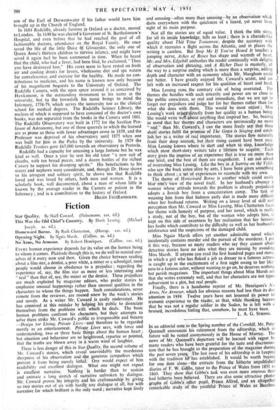Benefactor of Oxford
The Life of Dr. John Radcliffe, 1652-1714. By Campbell R. Holm.
(Faber. I ' • DR. JOHN RADCLIFFE rose from humble circumstances to wealth and fame, yet there was nothing of the suave or sycophantic courtier about him. Stories of his brusque speeches and unorthodox methods were current, fostered by his enemies but uncontradicted by his friends. He had his fashionable foibles and claimed kinship with the Earl of Derwentwater, a claim accepted by the third, but not by the first, Earl. As the aristocratic life and the attributes that grow from it can only begin and continue on the solid founda- tion of property, the claim may have seemed more likely towards the end of his life than at the beginning. Thomas Hearne said firmly, " He was a Yorkshireman and his father a plebeian." This was true, as his father was an attorney and Governor of the Wakefield House of Correction, but it is not incompatible with his claim.
He matriculated at-University College, Oxford, in 1665 when he may have been fifteen or even younger. The university had experienced a remarkable revival of learning, beginning in 1650 when Cromwell became Chancellor. During the Commonwealth the Royal Society met at Wadham, where there was a group of brilliant scientists, gathered by the Warden who was Cromwell's brother-in-law. During 1665 to 1684, the years when Radcliffe was resident at Oxford, the new scientific methods of observation and experiment were viaiWe there. , Obadiah Walker was his tutor, and the tie between tutor and pupil, always strong, was even closer when undergraduates were so young. A life-long friendship grew up. and Radcliffe became a Tory and maintained Jacobite sympathies all his life. He refused, however, to follow Walker into the Roman Church• and in later life offered to leave £3,000 a year to the infant son of the Earl of Derwentwater if his father would have him brought up in the Church of England.
In 1684 Radcliffe, already famous in Oxford as a doctor, moved to London. In 1690 he was elected a Governor of St. Bartholomew's Hospital, and even before that he had reached the goal of all fashionable doctors, attendance on the Royal Family. He once saved the life of the little Duke 6f Gloucester, the only one of Queen Anne's thirteen children to survive infancy, and might have saved it again had he been summoned in time. When he heard that the child, who had a fever, had been bled, he exclaimed," Then you have destroyed him." His cures seem to have rested on fresh air and cooling drinks for fevers, wholesome diet and spa waters for convalescence, and exercise for the healthy. He,made no con- tributions to medicine, and his name is known now only because of his magnificent bequests to the University of Oxford. The Radcliffe Camera, with the open space around it as conceived by Hawksmoor, is the outstanding monument to his name in the university, but to the townsfolk his name brings to mind the Infirmary, 1758-79, which serves the university too as the clinical school for medical degrees. The Radcliffe Science Library, the nucleus of which is supposed to have consisted of the doctor's own books, was not separated from the books in the Camera until 1861. The Radcliffe Observatory was built in 1772 for the Savilian Pro- fessor of Astronomy, but one of those quarrels to which the learned arc as prone as those with fewer advantages arose in 1839, and the Professor was deprived of his observatory until 1875 when one was built for Om in the Parks by the university. In .1929 the Radcliffe Trustees gave £65,000 towards an observatory in Pretoria.
Radcliffe had a capacity for amassing a large fortune but he was kind as well. Once a year he sent his old tutor "a new suit of cloaths, with ten broad pieces, and a dozen bottles of the richest Canary to support his drooping spirits." His benefactions to his sisters and nephews were considerate, and, though Dr. Hone shows us his arrogant and solitary spirit, he shows too that Radcliffe loved and was loved by others, both men and women. It is a scholarly book, well documented, about a man of whom little is known by the average reader in the Camera or patient in the Infirmary ; and is a contribution to the history of Oxford.
HELEN FITZRANDOLPH.



































 Previous page
Previous page